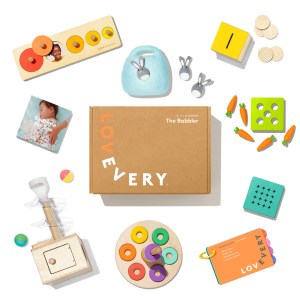Puzzling over puzzles—what the progression looks like
The days of putting together 1,000-piece puzzles with your child are still years away, but the cognitive elements of puzzle building have already started to connect in your toddler’s brain. When babies and toddlers start to manipulate toys and other objects to fit into a particular space, numerous skills are developing in their growing brains and bodies.
These toddler puzzle skills include:
Fine motor practice
These are the small, more precise movements babies and toddlers work so hard on when they play with physical objects, like grasping, pointing, clutching, squeezing, etc.
Hand-eye coordination
This refers to the way hands and eyes work together to complete a task.
Gross motor practice
Movements that work the larger muscles of the arms and legs, such as walking, jumping, and climbing, all develop gross motor skills. Puzzles tap into this too, especially the large-format kinds, like floor puzzles.
Recognizing shapes & spatial awareness
Toddler brains benefit enormously from practice with figuring out how things fit together how to orient and rotate objects, and predicting which shapes might fit a particular space.
Memory
Solving puzzles, even the simplest ones, is great for building short-term memory and forming neural connections in your toddler’s brain.
There’s a lot more going on, too, especially as your toddler gets older. Puzzles offer practice in resilience, teamwork, managing frustration, and even mathematical concepts like parts of a whole and symmetry.
What does puzzle-solving look like at each stage? Remember, as always, that every child develops differently and may have a trajectory with puzzles that differs from these benchmarks. It’s also good to give kids at all stages plenty of time to experiment, play, and explore—even if it’s not the “right” way to solve a puzzle.
Here is the general puzzle-solving progression babies and toddlers go through:
One-piece puzzles
Babies start to work with simple, one-piece puzzles around 6-8 months. Much of the time, that means mouthing the puzzle piece—that’s okay!
The pincer grasp
Close to their first birthday, your baby may start working on their pincer grasp (grasping objects between thumb and index finger). This allows them to start removing puzzle pieces more easily and even fitting one inside its resting place. Your baby will probably also love taking completed puzzles and dumping them on the floor.
Multi-piece puzzles
Toddlers start to work on multi-piece puzzles with simple shapes between 13 and 15 months; circles are a great way to begin. Especially if you offer some guidance, your toddler may start noticing when pieces do and don’t fit into a particular space.
Different shapes

Your toddler is probably ready to start working with different shapes when they’re around 18 months old. Whether those shapes are geometric, animal, or otherwise, there is a newfound understanding that different shapes fit in different places.
Jigsaw puzzles
An introduction to jigsaw puzzles might be just right when your toddler turns two—maybe even a little sooner. Simple, oversized jigsaw puzzles are a great way to practice this new way of fitting shapes together, and they lay the groundwork for more complex puzzling down the line. You can also introduce floor puzzles at this age, which engage the whole body in fun new ways.
In this post

The Play Kits
The Play Kits by Lovevery are thoroughly tested, baby safe, eco-friendly and Montessori inspired. Give your child the best start with our stage-based play toy subscription boxes.
Learn moreKeep reading


16 - 18 Months
Welcome to The Adventurer Play Kit for months 16-18
Watch Lovevery CEO Jessica Rolph introduce the Pioneer Play Kit for months 16 to 18 of your toddler's life.


16 - 18 Months
Puzzling over puzzles—what the progression looks like
Puzzles build fine motor skills, hand-eye coordination, and problem-solving strategies. Here is the progression of puzzle solving for babies and toddlers.


16 - 18 Months
Introducing the Wooden Stacking Peg Board—the Montessori way
Watch Lovevery CEO Jessica Rolph and Montessori expert Jody Malterre as they show some of the many ways your toddler can use the Wooden Stacking Pegboard.
